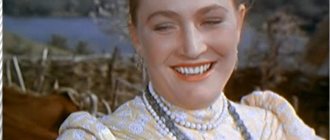Biography of singer Julian
One of the most mysterious and private singers of modern Russian pop music, whose personal life is no less interesting than his work. Julian was credited with having affairs with Nonna Mordyukova and Lyudmila Zykina and was accused of greedy interest in the inheritance of legendary Soviet actresses. There were also rumors about the artist’s unconventional orientation, which came to naught after his unexpected marriage in March 2020.
Singer Yulian Vasin
Childhood and adolescence
Julian was born and raised in Kolomna, near Moscow, in a friendly, intelligent family. His father is an aviation engineer, a graduate of the Moscow Aviation Institute, his mother is a teacher at a music school. It was she who named her son such a sonorous name, firmly believing that the boy would become an outstanding artist.
Julian in childhood
The press often describes a fantastic story about how, at the moment of Julian’s birth, a strong thunderstorm suddenly stopped and the sun came out, signaling the birth of a special person. Most likely, this is just a beautiful legend, like the fact that the boy was named in honor of Yulian Semenov, the author of the famous “Seventeen Moments of Spring.”
In early childhood, our hero was little different from his peers, he was mischievous and restless and often got into various troubles. Once he poured a pan of boiling water on himself, and at the age of seven he fell under the wheels of a motorcycle. Fortunately, there were no serious consequences, although Julian had to stay in the hospital for some time. By the way, in early childhood the boy dreamed of becoming not a singer, but a doctor. His grandmother was seriously ill, and Julian wanted to devote his life to medicine in order to be able to help her.
Since childhood, Julian’s mother instilled in her a love of music.
Mom had other plans for her son’s future. From the age of four, she taught him music and notation, and took him to concerts and musical performances. Impromptu creative evenings were often held at home, in which Julian was the central figure. The boy played music, sang, recited poetry and quickly got used to the applause and attention of the public.
Yulian Vasin in his youth
At school, he also stood out among his classmates, studied well, and actively took part in amateur performances. In the eighth grade, Julian passed the exams externally in two years and thus graduated from high school ahead of schedule. By that time, he could no longer imagine his future without the stage and announced to his parents his decision to enter GITIS. The father, an engineer, was not enthusiastic about this idea, considering pop singing to be frivolous for a real man. But my mother warmly supported her son and went with him to Moscow.
Julian in his youth
Julian passed the entrance exams brilliantly and, beating one and a half thousand applicants (such a competition was at that time at this prestigious university), became a student in the variety department of GITIS. And already in his second year he received the Grand Prix and a gold medal at the international song competition in Yalta, performing the song “Russian Waltz” by Pakhmutova and Dobronravov.
Julian at the beginning of his career
In 1994, the young man successfully graduated from the university, receiving two diplomas in the specialties “Variety Artist” and “Public Event Director”.
A person outside the system. Yulian Semenov
September 15 marks exactly twenty years since the passing of one of the most interesting people of the Soviet era, the author of unique bestsellers that received well-deserved recognition around the world, Yulian Semenov. He created the political detective genre in Russia, wrote scripts for the most famous Soviet films, which are still beloved by television viewers from dozens of countries. In his short but eventful life, he had to play the role of a diplomat, intelligence officer, traveler, researcher and even a politician.
Despite his popularity and lifetime recognition of his talent, the writer was not at all a man of the system and, contrary to the opinion of the majority, was not favored by the Soviet authorities. Yulian Semenovich has always been distinguished by his unfailing adherence to principles when assessing what is happening. He simply could not be attributed to the society in which he lived. A society whose laws he never understood or accepted. And all his merits were the result of titanic work, perseverance and boundless creative curiosity.
The biography of the born Yulian Semenovich Lyandres began in Moscow on October 8, 1931. The growing up of a boy from a family of Soviet intellectuals proceeded according to the usual scenario, until war broke into their lives, forcing him, along with his mother, Galina Nikolaevna Lyandres (Nozdrina), to evacuate to the city of Engels. The most vivid impression of the war years, according to Julian himself, was a trip to his father in defeated Berlin in May 1945, when he was fourteen years old. There, on what was recently enemy territory, our Victory was felt much more acutely, smelling of the gunpowder of recent battles.
After the victory, the family safely returned to the capital for permanent residence. Despite the fact that Julian’s father, Semyon Aleksandrovich Lyandres, was a well-known journalist in Moscow who organized his own publishing house, the boy did not immediately follow in his footsteps. After successfully graduating from high school, Julian Lyandres in 1948, having passed the exams, became a student at one of the most prestigious educational institutions in the capital - the Institute of Oriental Studies. In addition to the foreign languages Dari, Farsi and Pashto he studied at the Middle Eastern Faculty, during his studies the capable student independently mastered several European languages.
On April 29, 1952, Julian’s father was arrested on ridiculous, unfounded charges. He was accused of joint activities with the “Trotskyist saboteur” Nikolai Bukharin during the latter’s work at the Izvestia newspaper. The consequence of his father's arrest was the expulsion of Julian Lyandres from the last year of the institute. And after the young man flatly refused to renounce his loved one, he was expelled from the Komsomol. In the young guy’s personal file, a note immediately appeared with a note saying that he was “slandering the Soviet government and does not respect the decision of the Soviet court.” Julian tried for a long time to achieve the truth and free his father; his letters with requests to sort things out went not only to the prosecutor’s office, but also to Beria himself. However, all he managed to achieve was a summons to Butyrka for interrogation. Everything changed with the death of Joseph Stalin, the charges against Julian’s father were dropped, and he himself was reinstated in the institute, which he successfully graduated from in 1954. However, it was after the arrest of his father and the subsequent events associated with this that the young man learned one truth for himself, which he then adhered to throughout his life: you need to win without bending to circumstances.
The talented graduate was recommended for postgraduate study at Moscow State University, and already at the main university of the country he was invited to a teaching position. In parallel with teaching students the Afghan Pashto language, Julian graduated from the Faculty of History, receiving a second higher education. Hard study and work did not prevent the young man from enjoying the privileges of youth; on April 12, 1955, he married the adopted daughter of Sergei Vladimirovich Mikhalkov, Ekaterina Sergeevna.
Yulian Semenov's journalistic career began in 1955, when he wrote his first essays and stories for such popular publications as Pravda, Ogonyok, Komsomolskaya Pravda, Smena and Literaturnaya Gazeta. Initially, reputable publishers thought that the name Lyandres did not sound at all harmonious, so the young author had to take the pseudonym “Semyonov”.
The formation of the young writer’s personality was greatly influenced by his meeting with the brilliant Soviet international journalist Genrikh Borovik. After all, Semyonov’s first works were not at all similar to later adventure novels; they were rather psychological short stories with eloquent titles “My Heart is in the Mountains”, “Farewell to the Woman I Beloved”, etc. Yulian Semenov’s first steps as a screenwriter were made in 1957, when he wrote a script for the cartoon “Little Shego” based on one of the Afghan fairy tales.
The young writer’s vigorous journalistic activity was constantly combined with business trips not only to various hard-to-reach areas of the Soviet Union (to the taiga, to the Baikal-Amur Mainline, to polar stations), but also abroad. Curious and thirsty for adventure, Yulian Semenov always sought to get into the very center of events, wherever he was - in Afghanistan, Paraguay, Cuba, Chile or Spain. It was his journalistic work that allowed him to meet the leaders of many countries and regimes, for which he was sincerely grateful to fate. According to Julian's friends, he was always intoxicated by risk. For example, for some time he was searching for Nazis hiding from reprisals and tracking down mafia leaders. He also managed to take part in combat operations organized by Laotian and Vietnamese partisans. However, even under the bombs, Semenov constantly wrote something, took notes, and kept diaries.
In June 1958, a daughter was born into the writer’s family, who was named Daria. Soon, together with Natalya Petrovna Konchalovskaya, his wife’s mother, Julian went to China, and then business trips to Iraq, Lebanon and Iceland followed. Work as a translator in Kabul was reflected in Yulian Semyonov’s first large-scale work, the book “Diplomatic Agent,” on which he continued to work during his next trip with his family to Estonia. It was this book, published in 1959, that first attracted wide readership to the personality of the young writer. The work thrillingly told about the incredible adventures of a young orientalist named Vitkevich, who combined the work of a diplomat and a secret agent. In the same year, another work by the novice author was published, the documentary-journalistic book “Zhongguo, Ning Hao,” written in co-authorship with Natalya Konchalovskaya.
On September 14, 1960, Yulian Semenov, essentially still a very young man, became a member of the Union of Writers of the USSR. Soon the Central Committee of the Komsomol sent him to the Youth Festival in Finland. During the same period, Semenov worked as a correspondent for the Smena magazine, on whose assignment he went on a business trip to Iraq. The experiences of the trip were reflected by the writer in a series of stories, united under one title “Leaving to Return” and the story “49 hours 25 minutes”.
The subsequent years of the journalist and writer were filled with many trips, meetings and impressions, which provided excellent material for his new works. After traveling to the North Pole, Makhachkala and Koktebel in 1961, Yulian Semenovich published the story “On Duty.” And in 1962, Ogonyok sent its correspondent on a business trip to the Far East. At the same time, Semenov devoted a lot of time to studying archival documents and training on Petrovka, as a result of which one of the author’s most popular novels, “Petrovka, 38,” appeared, which later became the basis for an equally famous feature film of the same name. The author himself called his work a “research novel,” although the word “tabloid” was heard in serious literary circles.
From 1962 to 1967, Semenov was a member of the editorial board of the Moscow magazine. In 1965, the writer met the outstanding Russian front-line cameraman and documentary filmmaker Roman Karmen and purchased a country house in the small village of Krasnaya Pakhra. At the same time, he managed to prepare his novel “No Password Needed” for release, travel to Mongolia to film the film “Exodus”, and then to Poland, where he collected and processed materials for the novel “Major Whirlwind”, published in 1967- om year.
In February 1967, the writer’s second daughter, Olga, was born, who later became her father’s main ally and assistant in his busy life and work. He was not allowed to tinker with the doll for a long time; already in March Semenov had to leave home and go to Czechoslovakia with his eldest daughter, and in May he again went to the North Pole. In December 1967, the country's main newspaper, Pravda, sent Julian as its war correspondent to Vietnam, where the writer met Prince Souphanouvong, one of the leaders of the struggle for Laotian independence. After traveling around the United States in May 1968 and his father’s funeral in June, Semenov worked fruitfully in Germany and Czechoslovakia to collect materials for his new plan, the novel “Seventeen Moments of Spring,” while simultaneously compiling a collection of reports entitled “Vietnam-Laos.” The image of Maxim Maksimovich Isaev he created became one of the main ones in the author’s works. The fate of the literary character ran like a red line through twelve of Semenov’s novels, starting with “Diamonds for the Dictatorship of the Proletariat,” where Isaev participates in the events of 1921, and ending with “Bomb for the Chairman,” where the plot takes place already in 1967.
Some Soviet historians attributed the credit for creating the image of Stirlitz to Yuri Vladimirovich Andropov, since Semenov was often accused of working too closely with this politician. However, they were silent about the fact that even during conversations on sensitive topics, Yulian Semenov always maintained his own position, regardless of the generally accepted point of view of representatives of the authorities or society. He never made humiliating and dubious compromises.
In the year of the release of the novel “Seventeen Moments of Spring” in 1969, despite traveling as a Pravda correspondent to Japan, Australia, Singapore and Malaysia, the writer began work on the script for the film of the same name, which became a classic and a diamond of Soviet cinema. In the same year, Semenov published the story “He Killed Me Near Luang Prabang.” It seemed to everyone that Julian had much more in a day than twenty-four hours, otherwise it was simply impossible to explain how he managed to get everything done.
In 1970, the Cinematography Committee sent Yulian Semenov to Spain, followed by another visit to the USA, Singapore and the GDR. The writer, who had already become quite popular in his homeland, was awarded the medal “For Valiant Labor” for the first time. In the same year, he wrote the novels “Bomb for the Chairman” and “Diamonds for the Dictatorship of the Proletariat.”
During 1971-1973, Yulian Semenov continued to travel around the world, while working on the script for the film “Seventeen Moments of Spring.” At the invitation of his friends, he managed to visit Spain, and then France, Brazil and Chile. This was followed by a trip with his family to Hungary and Bulgaria (in July-August 1972), and in November there were again business trips from the Cinematography Committee to France, Spain, Andorra, Yugoslavia and Hungary. At the same time, Semenov produced literary masterpieces: the detective story “Ogareva, 6”, the story “Tenderness”, the novels “Alternative” and “Spanish Variant”. Work continued on the main script of his entire life.
After the release of the film “Seventeen Moments of Spring,” the director, main actors and even the cameraman were awarded the State Prize of the RSFSR. Ironically, the only one who was not among those awarded was the scriptwriter and creator of Stirlitz. They said that after this the writer was deeply depressed.
During a trip to Spain in 1974, Yulian Semenovich met the Nazi terrorist and saboteur Otto Skorzeny, who agreed to give an interview for the first time. The result of this meeting was the story “Skorzeny - Face to Face.” Later that same year, Semenov’s historical detective story “The Third Map” was released. And again the road and new assignments awaited him in Japan, Spain and the USA, where he met Edward Kennedy, the younger brother of President John F. Kennedy. In 1975, a collection of short stories, “Return to Fiesta,” was published. In April 1976, Literaturnaya Gazeta sent Semenov to Portugal, in July he was already in Cuba, and in August he traveled around Abkhazia with his eldest daughter. At the end of the summer of 1975, the writer was awarded the State Prize. Gorky. During a trip to Italy in 1977, Yulian Semenovich wrote the story “Capriccioso in Sicilian” about the connections of the mafia with Nazism, and in August he again went to Abkhazia with both daughters.
Semenov's great popularity as a film scriptwriter also did not allow him to sit still. In March 1978, he visited Poland to take part in the filming of a film about Felix Dzerzhinsky, then in April he was present on the set of the film “The Life and Death of Ferdinand Luce” based on his story “Bomb for the Chairman”. Only in August did Yulian Semenovich manage to enjoy a long-awaited vacation with his daughters in Crimea, during which, however, he did not interrupt work on the novel “TASS is Authorized to Declare.”
From 1979 to 1982, Semenov was a correspondent for Literary Gazette in Western Europe. There the writer met many famous people and curious personalities: SS Colonel General Karl Wolf, Hitler's personal architect Albert Speer, ballet dancer Serge Lifar, philanthropist baron Eduard Falz-Fein, artist Marc Chagall and writer Georges Simenon. It is with these people that the writer will subsequently create a committee dedicated to searching for the mysterious Amber Room. During the same period, his novels “The Death of Peter”, “Confrontation”, “Ordered to Survive”, “Face to Face”, as well as a book of short stories “Rain in the Drainpipes” were published. At the same time, the writer prepared scripts for two major films: “The Collapse of Operation Terror” and “TASS is Authorized to Declare.”
In 1982, Yulian Semenov was awarded the title “Honored Artist” and awarded the Order of Friendship of Peoples, and in 1983, the writer, on the advice of Lev Durov, began building a house in Mukhalatka in Crimea, which later became his main refuge and favorite place of work. In the same year, he visited France and Switzerland, completed and released new novels: “The Death of Stolypin”, “Auction”, “Intersections”, “Alias”, “Intercontinental Knot”, “Press Center” and the script for the film “Confrontation” " The next two years were still filled with travel and incessant writing, the novels “Expansion-1” and “Expansion-2”, “Scientific Commentary” were published.
In April 1986, the youngest daughter Olga went to England with her father to attend the filming of the film “Face to Face” based on Semenov’s script. In the same year, Julian was elected president of the International Association of Detective and Political Novel Writers (MADPR), and in May he and Olga visited the United States at the Edgar Poe Prize ceremony. It was very honorable for Yulian Semenovich to be elected a member of the New York Academy of Sciences in 1986.
In 1988, Semenov took part in the creation of the Soviet-French publishing house DEM and, together with Vasily Livanov and Vitaly Solomin, opened the experimental theater “Detective” in Moscow, which began to stage children's plays and action-packed detective plays on the topic of the day. Unfortunately, soon after the writer’s illness, the theater was closed due to undisclosed disputes about the rental of premises in the Central House of Officers, where it was located.
On May 13, 1989, with the direct participation of Yulian Semenov, the headquarters of MADPR was created in Moscow. In the same year, the first issues of the newspaper “Top Secret” and the magazine “Detective and Politics” founded by the writer were published, and in July-August he was a member of the team of the trans-Arctic expedition carried out on an Il-76 to King Jordan Island. And again, a time of continuous travel began in his life: first to Germany, then to the USA, Mexico and France. Such a tense rhythm of life, often full of hardships, with a lack of proper rest, could not but affect the health of this inflexible, but already middle-aged man. On May 20, 1990, during a trip to a meeting with foreign investors who were supposed to help the writer bring his newspaper “Top Secret” to the world level, Yulian Semenov suffered a stroke right in the car. Despite the rapid improvement in his condition (since November, Yulian Semenovich underwent a rehabilitation course of treatment in an Austrian clinic), the writer did not manage to fully recover from the illness that overtook him. In April 1991, he returned to Russia and lived at his dacha in Pakhra, trying to overcome the illness. But in September 1993, the writer suffered another (fourth) stroke, which became the cause of his death. The unexpected departure of the literary giant shocked many not only in our country, but also abroad. A huge number of people around the world were engrossed in Semenov’s works. Many different versions and speculations arose around the circumstances of his death. Some friends and even the daughter of Yulian Semenovich claimed that he was removed as a person who knew too much and was privy to various forbidden secrets of the powerful. Semyonov truly gleaned a huge amount of interesting knowledge from archival documents, studying which he spent a significant part of his life. He liked to say that “he who can control the past will never be confused in the present or lost in the future.”
It was in the archival repositories, on dusty shelves, that the past of humanity was presented in full view, it was there that Yulian Semenovich revealed many secrets and mysteries buried in papers. Perhaps they were the reason for his elimination. Or maybe the decisive role was played by the investigation that began in 1989 into the withdrawal of large capital from the USSR abroad. It is worth noting that all participants in this investigation died almost at the same time and under strange circumstances.
The reason could also be Semenov’s constant desire to find the notorious Amber Room, materials about which were given a special place in almost every issue of “Top Secret”. The writer was sure that this masterpiece, once stolen by the Nazis, was located in South America. Maybe he got too close to solving this mystery... One way or another, in letters to his daughters, Semenov always claimed that he considered the feeling of risk one of the main elements of creativity.
Books written by Yulian Semenovich are reprinted in millions of copies to this day. The constant creative rush, the desire to get everything done, despite his illness (for most of his life the journalist suffered from tuberculosis), going on periodic “creative binges”, when Semenov could spend months, isolating himself from the world, working on his works - all this alienated the brilliant writer from his family and subjected to enormous moral and physical stress. But this was the only way he could feel alive.
After the writer’s death, thanks to the efforts of his daughter Olga, Semenov’s main creative forge, a dacha in Mukhalatka, turned into a house-museum always open to visitors. Devoted connoisseurs of the work of a talented writer and an interesting person, finding themselves in the untouched environment of his rooms, can even today feel the unforgettable atmosphere in which the creator, a master of the literary genre and a tireless generator of the most incredible stories, worked.
Sources of information: https://www.semenov-foundation.org/museum3.html https://lib.rus.ec/b/167743/read https://www.e-reading.mobi/bookreader.php/1001478 /Semenova_Olga_-_Unknown_Julian_Semenov.html https://www.epwr.ru/quotauthor/txt_479.php
Creative path
In 1993, the young singer’s first solo concert took place at the Variety Theater.
This was followed by a performance on the stage of the State Central Concert Hall “Russia”, and a year later Julian became a participant in a large-scale event organized in the Kremlin in honor of the arrival of Queen Elizabeth II. Julian with the song “Russian Waltz”, concert for the Queen of England In 1995, he was entrusted with performing the Moscow anthem, and a year later the singer founded his own Song Theater. Boris Yeltsin admired Julian’s work; he especially liked the song “Russian Waltz,” which became a kind of calling card for the artist. Perhaps it was precisely thanks to the sympathy of the first president of Russia that such a rapid career of our hero became possible. In 1999, the singer was awarded the title of Honored Artist of the Russian Federation, and in 2008 he became People's Artist of Chechnya and Ingushetia. Julian has an Internet radio station “JulianRadio”, where, in addition to his own, songs of artists close to his spirit are broadcast.
In 1999, Yulian was awarded the title of Honored Artist of the Russian Federation
It is worth noting that the artist has a very skeptical attitude towards modern show business, which, in his opinion, is filled with amateurs. That is why Julian practically does not participate in national concerts and rarely appears on television. Recently, he has been actively collaborating with singer Anastasia, touring with her throughout Russia and countries near and far abroad.
The most interesting
Actors and actresses who left in 2020 (10/21/2017)
A fan of Jolie has undergone many operations, wanting to be like the actress (12/15/2017)
Bykov not only advised Yulian to quit teaching, but also helped him enter the Shchukin School, a year before graduating from which he made his debut on the stage of the Theater. Lenin Komsomol, playing a central role in the production of “The Wheel of Happiness”.
After graduating from university, Yulian Panich came to the theater. Pushkin, from the sixtieth year he appeared on the stage of the Theater. Lenin Komsomol. But Yulian Aleksandrovich didn’t really like the way his acting biography developed; the roles that were offered to him in the theater seemed insufficiently significant to him, and Panich went to television, starting a director’s career.
In the photo: Julian Panich in the film “Bloody Dawn”
Personal life of Julian
Julian is perhaps one of the most mysterious representatives of modern Russian pop music. His personal life is shrouded in many secrets and legends. The singer was credited with having affairs with Lyudmila Zykina, Nonna Mordyukova and even Boris Moiseev, hinting at a non-traditional sexual orientation. The artist categorically denies these rumors, declaring that he had only warm friendly relations with the great Soviet actresses, and Moiseev was exclusively a neighbor down the street.
Julian with his parents
At the end of 2020, Julian decided to let journalists into his personal territory and in Malakhov’s program “Let Them Talk” he introduced his fiancée, singer Anastasia Mintskovskaya, to an audience of millions. According to the performer, she was his most devoted friend for twenty-seven years, despite seven marriages to other men. During the program, it turned out that for the last few years the artists have been in a love relationship, which was the reason for the singer’s latest divorce.
The impetus for their rapprochement was a fire in Anastasia’s house, as a result of which the woman was left homeless. Julian came to his friend’s aid and gave her a luxurious mansion worth ten million rubles.
In 2020, Julian and Anastasia got married
On March 30, 2020, the lovers had a wedding, before which they corrected their appearance with the help of plastic surgeons. Julian's parents approved of their son's choice and expressed hope that the eighth marriage of the 53-year-old singer with their 45-year-old son would be the last. They gave the newlyweds a trip to the Maldives, where they could spend an unforgettable honeymoon.
Singer Julian now
In 2020, the singer will celebrate thirty years of creative activity. He approached this milestone with a solid baggage of nine albums and fourteen solo programs. Julian’s repertoire includes more than four hundred songs, including duets with Lyudmila Zykina, Lyubasha and Anastasia. Videos were shot for the compositions “Mother and Son”, “Flowers Under Your Feet” and “I Read You”; the singer also took part in the filming of the series “Group of Happiness”. Julian and Anastasia - Be with me The artist will celebrate the anniversary with a large solo concert in Moscow, in which he will present to the public both already well-known songs and compositions from the new album. After it, he will go on a big tour, which will last until late autumn.
Career in music
At the end of the institute, Julian was awarded two diplomas in the specialties “pop artist” and “director”. The aspiring pop singer performed at the competition with the song “Old Maple”, for which he received the Grand Prix.
Julian's first solo performance took place at the Variety Theater in ninety-three. At the same time, he took part in a concert held at the State Central Concert Hall “Russia”. Over the next few years, such performances became a regular occurrence.
The ninety-fourth year was marked by the arrival of the Queen of England, Elizabeth II, in Russia, in whose honor a reception was held in the St. George's Hall of the Kremlin. Of the pop performers, only Julian was invited, who performed the song “Russian Waltz”. In 1995, the young artist was honored to perform the Moscow anthem.










